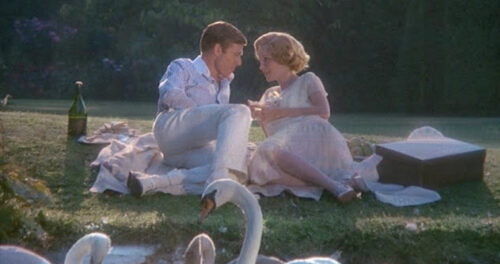[7]
F. Scott Fitzgerald’s most required reading is faithfully script-adapted by Francis Ford Coppola, with Jack Clayton directing a production as lavish as required for the story of the uber-wealthy but mysterious Jay Gatsby. We enter into Gatsby’s opulent world through the eyes of Sam Waterston as Nick Carraway. Robert Redford is superbly cast as the reticent but disarming Gatsby, who ends up roping Carraway into helping him rekindle a romance with his old flame Daisy Buchanan (Mia Farrow), who is unhappily married to Tom Buchanan (Bruce Dern), who is cheating on Daisy with Myrtle Wilson (Karen Black). This chain of affairs ends up exploding in everyone’s faces and ultimately brings about the tragic fall of Gatsby.
In high school, we studied The Great Gatsy as a cautionary tale about the callous rich and the dark side of the American Dream. But this film version leaves most of that up to the viewer to infer. Despite their questionable judgments, the characters are still human beings and the film encourages us to identify with them. The only weak link in this treatment of the material is Mia Farrow, whose stilted performance comes off too insincere for us to understand why on Earth Jay Gatsby would risk everything to bring her back in his life. While the film’s central relationship may not work, all the others do — especially Gatsby and Carraway’s bromance.
Gatsby’s mansion and his massive parties are brought to life beautifully. Douglas Slocombe’s cinematography is a stand-out as well. Among the supporting cast, Scott Wilson is memorably distraught as the beleaguered husband of Karen Black’s manic Myrtle Wilson, and Lois Chiles offers a less empathetic version of the aloof rich as Daisy’s friend Jordan.
With Edward Herrmann, Howard da Silva, and Roberts Blossom.
Academy Awards: Best Costume Design (Theoni V. Aldredge), Music (Nelson Riddle)

